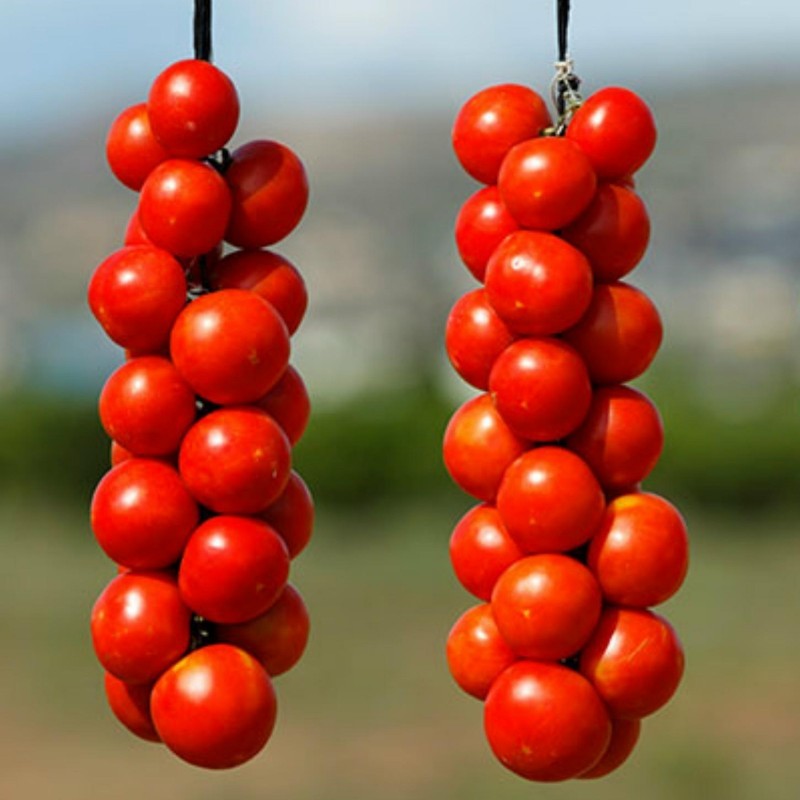
Varietate din Spania






Early, small fruits of 80 g approx., round-crushed form, gathered in clusters that allow being hung, thus facilitating its long conservation. Excellent quality to make "bread with tomato" for its thin skin
Early, small fruits of 80 g approx., round-crushed form, gathered in clusters that allow to be hung, thus facilitating its long conservation. Excellent quality to make "bread with tomato" for its thin skin and lots of pulp.
Hanging tomato is a perfect product to make a large number of dishes. Its texture and flavor make it a unique ingredient.
If the town of Alcalà de Xivert is known for something, apart from a rich archaeological testimony that goes back to the great Mediterranean cultures of antiquity, it is for cultivating and producing the Tomato de Colgar, in Valencian 'Tomata de Penjar' or 'de ramet'. Its difference with other kinds of tomatoes lies in its size, skin, color and long duration, in addition to a special feature to which it owes its name and which is none other than its artisanal way of being sewn with a thread and attached in a string.
Although the existence of this tomato is centuries-old and has an old seed, without any genetic modification, its history in terms of handling and conservation dates back to the Spanish postwar period. It was then that the families in the area, and as a philosophy of subsistence, began to stock up and store this vegetable in such a characteristic way that we know today.
This tomato is ideal to consume it raw although it can also be cooked. Its most traditional and widespread use consists of spreading it on bread and accompanying it with a little olive oil and salt. It is also usually eaten in salad and is very suitable for making sauces due to its abundance in pulp and water. Roast is an exquisite accompaniment for meats, fish or vegetables giving added value to any dish.
But what are the properties of the territory that make the production of this gourmet product possible? Experts say it is due to its condition as a rich and diverse landscape. A place of orchards, that extends between the beaches of the coast and the mountains of Irta and Murs, rich in waters whose level of salt is the precise one to grant to these tomatoes, which ripen to the intense sun and the breeze of a temperate Mediterranean climate , its particular flavor. In addition, its cultivation is respectful with the ecosystem and debtor of a centennial inheritance that harvest after harvest has allowed to obtain the seeds of the best tomatoes. In this sense, these lands are subject to traditional crop planning whose purpose is to prevent various pests and diseases. The alternation of the tomato with the artichoke is the most common of this rotation system, in which the succession of vegetables from the same family as the tomato, such as peppers, eggplants or potatoes, is always avoided. The soil is also fertilized with fertilizers of animal origin, since in this way its natural biological activity is favored.
Thus, the Alcalà de Xivert Hanging Tomato is marketed and consumed as a fresh product throughout the year due to its long preservation. It is harvested in summer and lasts hung without refrigeration until March / April with the peculiarity that it is in these months when it intensifies its flavor.
But how is it possible to keep it practically all year without cold stores? The key is that the tomato does not present any cut or fissure, for which two product selections are made, one before hanging and another shortly after doing so. But, in addition, it must be kept in a cool place (maximum 24 degrees), shaded and airy, with little temperature change and without exposure to high heat, excessive humidity or bad odors.
It was 10 years ago when farmers in the area joined to create the current Association of Producers and Marketers of Tomato de Penjar de Alcalà de Xivert with the aim of revaluing this unique vegetable. But their commitment was not there and in 2008 they managed to obtain the Quality Mark of the Valencian Community.
A quality brand that makes sure that we are facing a Premium tomato. Of course, its nutritional properties do not differ from those of a conventional one. It is an abundant source of antioxidants, it has vitamins A, C and K, in addition to abundant potassium and iron. In fact, its main substance, lycopene, is linked to the prevention of diseases such as lung and prostate cancer, digestive tract tumors, atherosclerosis and heart attacks.
Fisa tehnica
 Reviews (0)
Reviews (0)